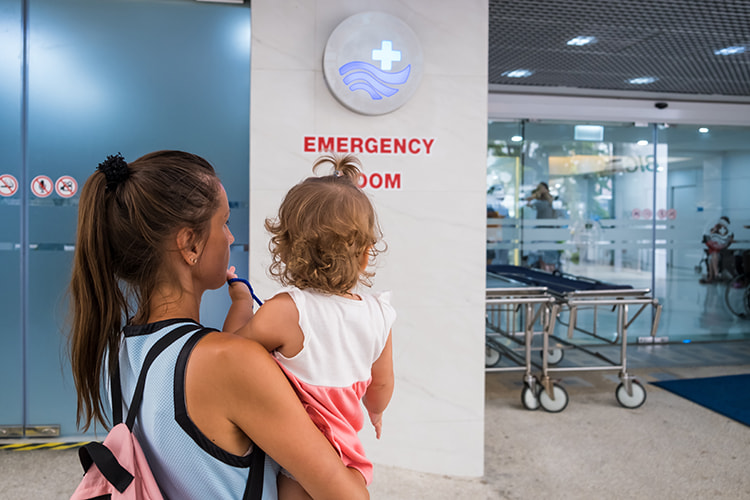
Health emergencies are some of the most devastating. They touch you in ways that few others can. Not only can they be emotionally devastating. They can also quickly become financial albatrosses that threaten your way of life and your family’s financial stability. Planning for health emergencies is essential as you manage risks and improve your financial health. Understanding health emergencies can help you prepare so you can hopefully ease the financial strain they create when they inevitably arise.
Types of Health Emergencies
When it comes to your health, many different types of emergencies may arise, including the following:
- Short-term injury emergencies. Broken bones, slip and fall injuries, auto accident injuries, etc.
- Long-term injury emergencies. These are injuries that will require more extensive treatment and even surgery to repair, along with the possibility of physical therapy and lengthy recovery periods.
- Short-term illnesses. These include influenza, pneumonia, bronchitis, and similar illnesses that disrupt your ability to work and may even result in hospitalizations in extreme cases.
- Chronic illnesses. These include many types of cancer, diabetes, heart disease, kidney disease, high blood pressure, Alzheimer’s disease, and arthritis. They require lengthy treatments, sometimes require hospitalizations, and often result in death.
While there is no such thing as good health emergencies, some are far less emotionally, physically, and financially devastating than others. A plan to manage costs and facilitate recovery is always wise for all health emergencies.
Financial Implications
Healthcare in the U.S. is undeniably expensive. For example, a three-day stay in a hospital can cost as much as $30,000. When you add the costs of healthcare services to other expenses like lost wages from work, transportation, and a spouse's lost income due to caregiving, the financial burden can escalate rapidly. The costs rise even more quickly with more extended recovery periods and the need for various types of care, such as physical therapy, hospital stays, and surgeries. Moreover, some injuries and illnesses can lead to permanent disability or require several months off work for recovery, further increasing the financial impact.
The Importance of Health Insurance
Health insurance is your number-one defense against financial ruin after a health emergency. Even with health insurance, the costs can be astronomical. You certainly want to combine your health insurance investment with a robust saving plan to manage medical bills that will mount in a health emergency and help manage living expenses for the duration. Even the best health insurance policies do not cover every possible contingency and may leave many expenses uncovered. However, a good health insurance plan can mitigate the costs to make these emergencies much more affordable than without health insurance. Remember the $30,000 three-day hospital stay? With some insurance policies, your portion of that bill would be around $500 daily. While it’s not exactly pocket change, it is much more palatable than the initial $30,000 toll.
Out-of-Pocket Expenses and Health Savings
Healthcare in the U.S. often incurs out-of-pocket expenses, even with a comprehensive health insurance plan. It's beneficial to consider a Health Savings Account (HSA) in addition to your insurance to prepare for these out-of-pocket costs. An HSA, which uses pre-tax income, can help cover various medical expenses, such as copayments for office visits, emergency room visits, hospital stays, and physical therapy. These funds can also contribute towards meeting your deductible or covering your annual maximum out-of-pocket expenses.
While HSAs are valuable for managing healthcare costs, they are used primarily for expenses your insurance would typically cover and come with annual contribution limits. That means they are not suitable for elective surgeries not covered by insurance. If you have a personal savings account set aside for healthcare, you can use these funds with greater flexibility, including for expenses that your HSA doesn't cover.
Planning for Prescription Medication Costs
Prescriptions can be another significant expense. That is especially true if you have a chronic condition that requires daily medications. The strain on a budget can be profound. You're in luck if you have good prescription coverage through your health insurance. However, some people have found prescription discount programs through pharmacies and services, like GoodRX, can help them save over even their standard prescription copayments.
Long-Term Care and Disability Insurance
It's wise to consider long-term care and disability insurance, but you should carefully weigh their costs and benefits. Not all insurance plans offer the same protection. It's crucial to choose one that fits your future needs and budget. By comparing different plans, you can find one that gives you the right coverage and peace of mind for the years ahead. Remember, the right insurance plan can make a big difference in your life, especially as you plan for the long term.
Legal Documents for Health Emergencies
You can use two legal documents to manage health emergencies. The first is a living will, which directs how you want your medical care handled if you're incapacitated and unable to express your wishes. The second is a medical power of attorney, which appoints someone to make medical decisions on your behalf when you cannot do so.
Navigating Health Emergencies
Navigating health emergencies is akin to walking a tightrope 40 feet high, where a single misstep can lead to a hard fall. The safest approach is to start with a solid health insurance plan and establish a robust health savings plan while you're healthy. This way, your savings can grow in value and be ready for you when needed.
Takeaways
There’s no substitute for a good plan. Unfortunately, the very nature of health emergencies often throws the best plans out the window. Barring that, good health insurance, robust savings, and a solid support system can be the best medicine during health emergencies of all shapes and sizes.